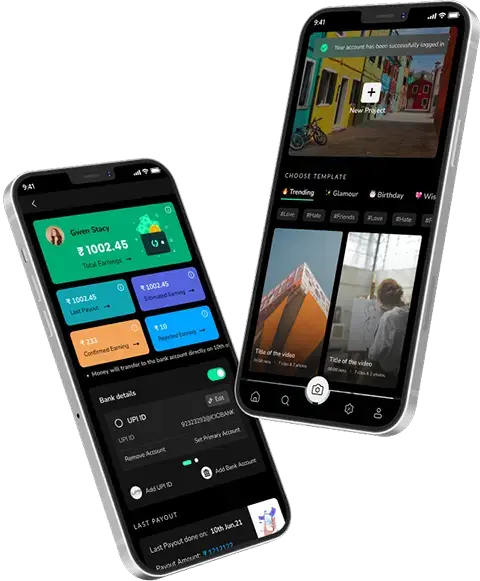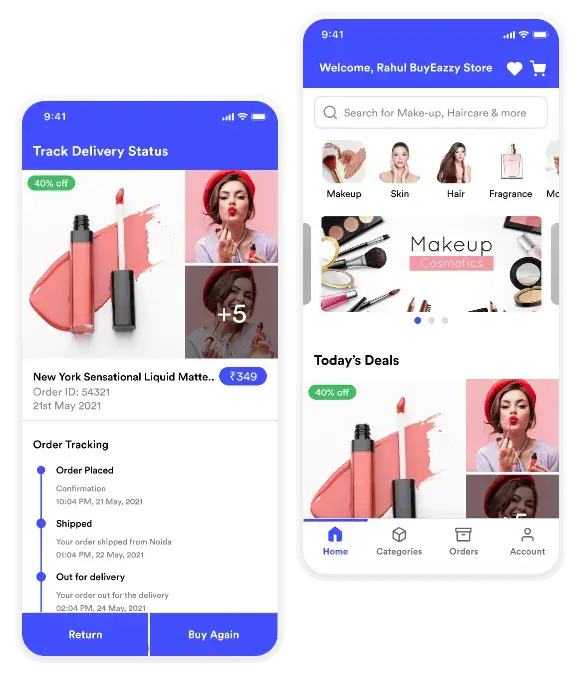AI is an awe-inspiringly disruptive technology, and everyone is witnessing radical changes in their lives. From education, gaming, and even shopping to the internet and communications, AI is leading in the right direction with impressive abilities that allow individuals to connect and be involved. According to a study, AI will contribute up to $15.7 trillion to the world economy by 2035.
Artificial Intelligence is the next frontier of all brands looking towards an architecture for future-oriented business. Alongside other domains of interest, such as retail, this is one industry impacted by AI-powered applications that are likely to be significant.
This technology-driven huge transformation is everywhere, including fields like education, fintech, etc. This raises the question, “How to boost sales in retail with AI applications?”
You’ve undoubtedly seen or heard about the sweeping impact of this technology being adopted by industry leaders to increase their presence in the market and generate profit. Healthcare-related technologies like AR and VR are transforming diagnostics, appointment booking, doctor-patient interactions, and more.
To take advantage of the latest technologies, you must locate the ideal AI app development company for app and software development proficient in AI and ML. With the right strategy and features application, every retailer will be successful by gaining more user satisfaction and return on investment.
In this blog, we’ll focus on the key elements of retail apps that could be improved using AI to facilitate the sales cycle transition effectively. In addition, we’ll look at some examples to understand the importance of AI in online shopping and why companies should consider investing in it! In the end, we will know what AI app development company can we trust with AI integration into retail apps.

Understanding AI In Retail
Various industries utilize the term “artificial intelligence,” but most people don’t know its meaning. When we speak of AI, we are talking about different tools, including machine learning or predictive analytics, which can collect, analyze, and process vast amounts of data to anticipate, forecast, or inform businesses in making precise decision-making based on data.
The latest AI analytical tools can operate autonomously, transforming non-processed data from sources like the IoT (Internet of Things) and various other sources into insightful data. Furthermore, AI in retail uses behavioral analytics and customer intelligence to boost customer service interactions and gain valuable knowledge about the marketplace’s different characteristics.
Artificial intelligence-based applications include software or apps that use AI to complete specific tasks, improve capabilities, and create customer benefits. These applications can improve results in diverse sectors, such as manufacturing, healthcare, and retail sales, by reducing the time required to complete tasks. They enhance customer experiences and use computers, machine learning, and various AI strategies.
The Role of AI In Retail: Enhancing Consumer Engagement
The retail industry has always been customer-focused, focusing on keeping, engaging, and maintaining customers’ attention to succeed in the current competitive market. They ensure that long-term profit and high productivity are the top priority. Additionally, the retail sector changes constantly (so do consumers’ expectations). The desire of the average customer for personalized shopping experiences with flawless interaction and excellent customer service will continue.
Businesses that use conventional methods such as traditional marketing programs and static displays of products must assist in providing an enjoyable user experience. This is because innovative retail stores have begun considering AI for their operations and are eager to explore the possibilities.
Artificial Intelligence (AI) helps retail stores push their boundaries to create an engaging, customized experience that enhances customer interaction and increases business. In addition to tailoring shopping experiences, improving product visualization, and automating customer service. Providing intelligent suggestions, AI is revolutionizing retail and the way companies perform and interact with customers.

Benefits Of AI-Driven Applications To Optimize Retail Sales Processes
AI-driven applications developed by AI app development company can bring many benefits to retailers.
1. Personalized Shopping Experience
For a week, the latest cushions are on a website; however, it doesn’t show your best selection after that. Then, you will cease using the shopping application. You will, however, be drawn towards an online site that showcases similar items to those you just saw a couple of minutes ago.
That’s what differentiates AI-powered applications from regular shopping websites. The personalization of the user makes all the difference. This is why almost every online shopping application relies on the latest technologies to analyze user behavior, collect user information, and then suggest items that customers will find interesting.
2. Demand Forecasting
Retail businesses must deal with numerous responsibilities, among which is inventory management. Planning out-of-stock and available items, choosing the most purchased items, and categorizing customers are just a few areas that require a constant eye, and AI could be utilized to help improve these.
The past was when stores used spreadsheets or similar tools to maintain track of their inventory but were prone to data errors. There is a higher chance of more significant mistakes when the range of products is more fantastic and when those are purchased from various categories.
It’s a good thing that AI-driven analytical tools and demand forecasting tools can automate this process dramatically. Although this option doesn’t directly increase sales at retail stores through AI tools, it allows top brands to concentrate on the sales process rather than wasting energy and money managing inventory.
3. Inventory Management
Managing inventory in retail stores is a much more complicated process for established firms. It requires a significant amount of time and manual work to keep track of the information, which depends on the scale and kind of business. With the other post-sale and pre-sale issues, automating is an essential factor in streamlining the management of inventory.
A retailer has cameras placed on the shop’s highest shelves to determine which products need higher quantity. An inventory management system that AI powers could help retailers utilize cameras and sensors to overcome these issues and keep the inventory in order.
4. Business Decisions Based On Information
Data collection is an issue, but understanding the implications of it is a different issue that businesses have to face. The traditional analytics tools aren’t without merit. However, AI and machine learning provide a new perspective. Artificially-driven predictive analytics is distinguished because it offers businesses unbiased knowledge and reliable estimates of future demands, regardless of certain items or for entire segments within an online shop.
5. Quick Support For Buyers
The staff you employ is only sometimes available to answer buyers’ questions due to the high cost of providing 24/7 human assistance. But you can count on chatbots powered by AI to help your customers and give them the information that will convince your targeted audience to make a more informed purchasing decision.
6. Enhanced Loss Prevention
Brands may also use AI to enhance their loss prevention strategies. Certain retailers use AI devices at checkout counters that determine the weight of their products and tell if customers prefer a cheaper substitute instead. Other retailers use AI-powered video cameras to track shoppers’ movements and alert them to anything suspicious. All of these features can complement the retailers’ current loss prevention methods, like RFID technology.
7. Supply Chain Optimization
What happens if you need more leads but an effective supply chain process? In this scenario, only an AI-powered program can assist you in managing the post-retail procedure from creation until delivery. Beyond forecasting demand, Supply chain management is a different aspect of retail, which does not require buyer interaction. However, it affects sales by reducing expenses and improving effectiveness.
8. Promotion, Merchandising, And Advertising
AI-driven retail solutions play an integral part in marketing and design. They help segment consumers, create content, and conceive and execute specific advertisements. For example, Walmart has already adopted AI to analyze its competitors’ offerings and plans to use robotics to optimize shelves within the next few years.

Ways In Which AI Is Boosting Retail Sales
AI can bring in $2.2 trillion in retail and wholesale value in 2035. It will do this through AI to improve inventory management, automate the management of warehouses, and provide an immersive and enjoyable customer experience. How will AI assist you in increasing the sales of your business, improving efficiency, and engaging customers? Let’s have a look.
Also Read – When E-commerce Meets AI: Explore The Perfect Match for Fashion
1. Smart Forecasting
Thanks to AI techniques, sales professionals can more accurately estimate quarterly sales figures. As these forecasts become more exact, there’ll be less space for wasted time. Being aware of the type of revenue you will likely earn during the coming quarter will assist businesses in making more effective resource management and operation decisions.
2. Price Optimization
Pricing the proper amount can be challenging when deciding which items to cut back and at what level. You’re also trying to make sales but aren’t looking to sacrifice the most cash. These decisions were extremely difficult for sales leaders, but not anymore.
Mobile app development company create algorithms that can perform tasks much more efficiently. AI can assist in finding the optimal discount rates. This is based on studying specific aspects from previous sales that proved profitable and unreliable.
3. Leverage Data To Negate Bad Product Cycles
Similarly, AI can also be utilized to determine market demand at any time if companies engage with this strategy to avoid a negative product development cycle and the reality of discounting stocks. Because of serious stakes, fashion stores have integrated AI into their business processes, and it’s challenging to recover from bad purchasing decisions. With the help of AI and big data analytics, the business hopes to detect trends and set prices. It also hopes to manage inventory better and develop a quick and adaptable supply chain.
4. Up-Selling And Cross-Selling
Over the years, retail stores have discovered that the fastest and most cost-effective method to increase revenue top-line is to market more of their products to customers who already have them. But knowing who will most likely spend more money is always complicated. Sometimes, they need to spend more funds on the right customers.
With the aid of AI, retailers will find a cost-effective way to cross-sell or up-sell to loyal customers and boost revenues effectively. Presently, there’s an evolution between e-commerce and m-commerce. We can anticipate AI becoming the heart of m-commerce as the industry evolves to offer better customer experiences.
5. Fraud Detection
Retailers suffer substantial losses from shrinkage, non-scans, and other fraudulent activities, which add around $45 billion annually. The issues affect a business’s profitability, confidence, and customer satisfaction. The good news is that AI offers a simple solution for the problem of checking out.
AI algorithms can examine checkout line video feeds and high checkout situations where merchandise is left without being scanned. They help retailers spot potential losses by notifying the checkout staff quickly about the problem. Furthermore, AI can help with automated scans without needing the item to be scanned. AI can help identify the fraudulent behavior and errors that occur when you check out, improving precision and preventing future loss.
Also Read – How does an Artificial Intelligence App add Great Potential to your Business?

Challenges Of AI In Retail
To avoid the possible pitfalls of AI, companies must remain aware of the following business hurdles.
1. Overpromising Functionalities
A potential drawback to using AI for retail in this beginning stage is the tendency to oversell features that aren’t feasible or do not always perform as promised. Companies may be able to attract customers who are interested in the product but then be unhappy if it fails to meet their expectations. The result could have significant negative consequences for the company’s reputation.
2. Security Risks
Every brand knows that customers’ personal information and other proprietary data must be secured in all circumstances. Anyone who decides to use AI should ensure that AI platforms comply with the law and provide minimal risk of data breaches. In addition, those who use open-source systems of whatever kind must be aware that private data could be hacked.
3. Customer Perception Regarding Ethics
Consumers continue to ask for greater transparency regarding how their personal information is used and collected. Retailers must make these details available, particularly regarding integrating any AI technology. Consumers must be able to accept their privacy and security of their data. Because AI is not yet a mainstream concept for many people, retailers might need to provide more details about the application of AI to address their customers’ ethical concerns.
4. Technology Integration Challenges
To successfully utilize AI and revolutionize retail, firms must put money into skilled employees who can incorporate it into the existing technology. AI can drastically streamline retail operations regarding inventory management, operations, and customer service. However, retailers must keep up-to-date with the technology and workforce to enable seamless integration. Without this, risks like inadequate data management and poor customer experience could be an obstacle to the company.

Consult AI Experts To Integrate AI In Your Retail Business
Once you have realized the enormous possibility of artificial intelligence within the retail sector and gained insight into some amazing real-world examples, you’ll want to incorporate AI solutions in your enterprise. Before you decide to embrace and implement AI, using AI consultation services provided by expert specialists is essential. But for that first you should know how to choose a mobile app development company and the best one. So that they can help ensure a seamless, efficient, and practical integration process.
This is how an expert AI consulting can benefit sellers who are making use of AI:
1. Identifying AI Opportunities
Artificial Intelligence encompasses numerous tools and applications. However, AI experts have the experience and experience to assist in identifying the areas in your retail company where the introduction of AI tools will significantly impact your business. AI experts will help you identify opportunities for your business processes in which AI could help improve processes, streamline operations, make interactions more personal, and enhance involvement.
2. Finding The Right AI Solution
AI experts can work closely with retailers and analyze their challenges, needs, and goals to suggest the most suitable AI solutions. Suppose you’re looking to customize the shopping experience or increase the amount of inventory you have. In that case, AI consulting experts will assist you throughout the integration procedure, from drafting AI models to the implementation process through post-integration maintenance and support.
3. Ensuring Seamless Integration
Integration of AI solutions without affecting your business processes is challenging. AI experts possess the know-how and experience required to ensure an effortless transition without impacting retailers’ workflows.
4. Maximizing ROI
Nearly every retail business owner has considered investing in AI integration as a long-term investment. Once you have discussed your business goals and the methods and issues, AI consultants can design and create a plan for maximizing the return on investment.
5. Building a Future-Proof Strategy
As we all know, artificial intelligence and consumer expectations are constantly developing. Retailers must be able to adapt to changing technological developments and consumer expectations to remain in the game. AI experts help you build long-term, sustainable AI growth strategies. This will ensure that AI products can adapt to the latest trends and thrive within the constantly changing retail market.
The Future Of AI In Retail
The application of AI within retail is advancing quickly due to its capability to assist retailers in understanding their customers’ behavior. Also help them improve the efficiency of their operations, and enhance the overall customer experience. Let’s see what AI can bring to the table in the future when integrated by a top AI app development company:

1. Stores That Have Automated Checkouts
For example, cashierless retail stores will be more popular. Customers can take their items home and go out while their AI system automatically bills the purchase. This makes shopping easier and minimizes friction during checkout.
2. Sustainable Checkout Source
AI is used to monitor and confirm the sustainability of products and ensure ethical sources. People are more conscious of the environmental and moral implications. AI will provide a clear supply chain picture to help make conscious shopping decisions.
3. Price Forecasts
AI can assist retailers in price adjustments and plays a vital role in forecasting prices. Retailers can use AI to consider various factors, including changing product demand, needs, seasonal trends, and the dates for releasing brand-new models in the same industry. This allows the retailer to create top predictions about price. Customers can benefit from this service by knowing when and how much of an item could change and how fare prices for the coming months are available, allowing for more efficient shopping scheduling.
4. Drone Delivery
Drone deliveries are already on the horizon and nearly becoming a real-world reality. Businesses can now use self-piloting drones to deliver packages. Even though these systems are being tested, it will not be too long before drones can deliver items in less than 30 minutes. This will revolutionize the speed and effectiveness of last-mile online shopping delivery.
5. Voice Search
Many companies have already begun employing voice search technology for quick exploration and search user experiences. In the future, the industry’s top executives will likely use more sophisticated versions of the technology to make the shopping experience easier for shoppers. With more and more customers relying on the convenience of voice searches, retailers are likely to incorporate technology for voice searches into their websites. Trust us, it enhances the entire shopping experience.
6. Tracking Customer Satisfaction
A few retailers, such as Walmart, have introduced facial recognition systems that identify customers’ moods through AI in their checkout lines. Retailers evaluate whether customers are pleased or unhappy with the purchasing experience. As time passes, retailers will continue to adopt technology for mood tracking to track customers’ moods. The data collected will allow retailers to develop stronger bonds with their customers by offering better customer experiences on subsequent shopping trips.
7. Automated Product Tagging
AI will revolutionize the way catalogs tag products. Imagine a situation where the jacket can be easily tagged using descriptors such as “red,” “short sleeve,” “leather,” and so on, without the intervention of humans. The streamlined process not only saves time but also enhances effectiveness.
An automated process for tagging products holds enormous potential to improve visual and text search abilities, provide precise recommendations, and create a smoother and more enjoyable shopping experience. Over the next few years, automated product tags will make shopping more delightful for customers.
8. AI To Detect Emotions In Retail Stores
The emotion-spotting AI detects human emotions by analyzing facial expressions, words, and movements. It will personalize the buying experience by studying customers’ facial expressions while browsing the merchandise and aisles.

Conclusion
The technology is there to assist firms in improving their strategy for engaging those who are their primary audiences and people involved. Through AI technology, integrated by a skilled AI app development company, you will increase your brand’s visibility on the internet and find ways that an organization can be prepared for the future. By leveraging AI, businesses can make more educated decisions, create higher revenues, and retain many more clients.
AI transforms the ways that stores run, and retailers should take note of its benefits. But it’s essential to consider the various options AI is incorporated in retail businesses, considering cybersecurity, data accuracy, and privacy issues. AI-driven applications could change how retail stores sell their products, increase expansion, and provide top-quality customer support. By partnering with an advanced AI app development company, retailers could discover new avenues as they overcome barriers to stay ahead of competitors in the age of technology using AI technology.
Techugo can be the right partner for retailers looking to build AI-driven apps. Our expertise in AI and machine learning can help you harness the power of data to enhance customer experience, optimize operations, and drive sales. Let’s build the future of retail together! Get in touch with us to discuss your retail dreams.
Post Views: 2,265




 SA
SA
 KW
KW
 IE
IE AU
AU UAE
UAE UK
UK USA
USA
 CA
CA DE
DE
 QA
QA ZA
ZA
 BH
BH NL
NL
 MU
MU FR
FR
































